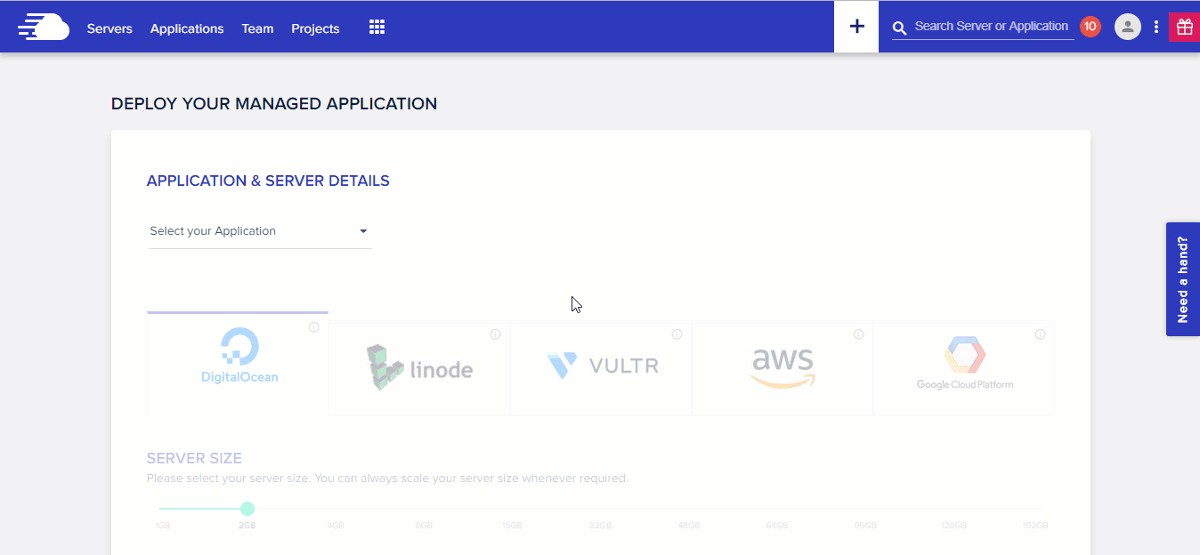This article was created in partnership with Cloudways. Thank you for supporting the partners who make SitePoint possible. Looking to partner with SitePoint? Get more information here.
When it comes to end-to-end services, digital agencies offer an impressive range. From requirement analysis to post-deployment maintenance, these agencies do everything to make sure that their clients are able to fully leverage their projects for maximum business efficiency.
In this backdrop, many agencies (particularly those that deal with web-based projects) also offer hosting as part of their services to their customers. While small and up-and-coming digital agencies might not have hosting on their service brochure, mid-tier and top-shelf agencies see hosting as an integral service offering to their clients.
Setting up Hosting for Customers
For a web-based project, web hosting is an essential component that determines the success (and failure) of the project. Since the agency has developed the project, many clients trust the agency-managed hosting for their project.
High-performance applications (online stores and CRM in particular) demand a hosting solution that’s able to keep pace with the high request volume and a large number of concurrent connections. Clients with these projects can’t compromise on the post-deployment performance of the applications. As such, agencies prefer an in-house hosting setup that caters to the specific requirements of the projects.
Agencies Benefit From In-house Hosting
Before going into what benefits agencies get from an in-house hosting setup, it’s important to understand the major requirements of high-performance projects. Without going too much into the details, in-house hosting solutions are set up to make sure that custom-built projects continue to perform on the following parameters:
- the number of visitors per hour/day/month
- the number of simultaneous visitors
- the maximum number of connections allowed
- the number of simultaneous requests/orders
- the size and complexity of the products catalog (number of products, product categories, attributes)
- the content requirements and traffic on content assets such as blogs
- the volume of search queries on the site
- the size and connections on the database
With in-house hosting solutions, agencies (and their clients) get a whole range of benefits such as those outlined below.
Until December 4th, 2019, Cloudways is running a Black Friday offer with 40% off for 3 months on all hosting plans. Use the promo code “BFCM40” while signing up at Cloudways.
Custom Hardware and Software
Hardware requirements for custom, high-performance projects generally include three components: CPU, RAM and Disk Space. Since each project has custom requirements that are often not available in off-the-shelf hosting solutions available in the market, agencies opt for setting up in-house hardware platforms for their customers.
Custom hardware setups usually cost more than the conventional, commercially available hosting hardware architecture. The cost of setting up and maintaining the hosting architecture is usually the responsibility of the dev agency, which usually bills the client for these services.
Another related (and in my opinion, more important) requirement of these projects is a custom environment that comprises an OS layer and a facilitation layer made of servers and caches. A custom environment allows agencies to build their projects without worrying about conflicts with the OS and server software required to execute the codebase. Thanks to in-house hosting, digital agencies can completely customize the OS and server layer to the project specifications.
End-to-End Management of Project Hosting
Project requirements change and clients often revise their requirements and scope. These changes also impact the hosting requirements and specifications. Since the hosting process is being managed in-house, the agency can take proactive actions to improve hosting setup specifications and ensure continued performance for the application.
Passive Income Stream
In almost all cases, agency-managed hosting solutions are built and maintained on the client’s dollars. The agency proposes hosting setup specifications and sets it up once the client pays for it. Once the setup is active, the client pays for the maintenance and upkeep of the hosting solution. This is a passive income channel that is often an important supplement to agency revenues.
Challenges In-agency Managed Hosting
Despite the benefits, managing an in-house hosting setup can prove to be a drag on the agency operations. In particular, agency-managed hosting causes the following challenges for the business processes.
Hosting Architecture Requires Continuous Attention
Since this is an in-house managed hosting solution, it’s obvious that the agency is responsible for keeping both the hardware and software layers operational. While the hardware layer (the physical server machines and the networking equipment) have a lower ratio of failure, it’s important to note that the software components of the hosting solution require detailed attention and upkeep.
Both hardware and software vendors regularly release patches that fix bugs and enhance product functionality. In many cases, these patches are mission-critical and essential for the continued performance of the project’s hosting. In in-house managed hosting, this is the responsibility of a dedicated team that performs no other function.
The Constant Need for Security
Web servers are the prime target of cybercriminals because of the wealth of information and user data on them. The problem with server security is that it’s a full-time function that requires specialists on the team. The same goes for clients’ applications (CMSs such as WordPress are especially vulnerable) that could potentially open up security loopholes in the server and application security. Not many agencies can afford a dedicated infosec expert on the payroll. Thus, there’s always the danger that clients’ applications can get hacked because the agency-managed hosting is unable to maintain the required security standards.
Sysadmins Prove to be an Overhead
Sysadmins are among the highest-paid professions in the ICT industry, and rightly so! They manage entire data centers and handle all aspects of hosting servers from provisioning to maintenance. The problem with sysadmins is the high recruitment and operational costs of these professionals. Thus, hiring a sysadmin to manage in-house hosting is a serious decision that’s out of the budget of many dev agencies.
Deviation from the Core Business
Digital agencies are in the business of building applications and custom projects that create value for their clients. An in-house hosting solution requires competence that lies outside the normal scope of the dev agencies. In addition, managing hosting solutions require expenses that eat away into profits without generating enough revenue to justify their inclusion in business offerings.
Shared Hosting is a False Start
The good news is that many agencies are aware of the issues with in-house, agency-managed hosting and have come to realize that this is not the ideal solution for managing clients’ hosting focused expectations.
However, since the clients’ requirements continue to grow and the need for hosting solutions for custom-developed apps is on the rise, a number of agencies have turned to shared hosting as an alternative to agency managed in-house hosting solutions.
When opting for shared hosting solutions, agencies try to reduce the cost of hosting solutions while providing a comparable hosting solution to the clients.
Before going into the description of why shared hosting solutions are in fact counterproductive for dev agencies, it’s important to understand how shared hosting solutions work.
Shared Hosting in a Nutshell
As the name implies, shared hosting is a solution where several websites/applications are hosted on a single physical server. This means that the physical resources (CPU, RAM, Disk space and bandwidth (in some cases) get shared among the websites hosted on the server.
While this is not a bad solution per se, it’s not the right ft for high-performance applications. These applications have a minimum server resource requirements that often exceed the allocated “quota” allocated by the shared hosting server.
Many digital agencies try to integrate shared hosting solutions in their customer-focused services by eliminating sysadmins from the equation and asking the developers to manage the hosting servers for the clients.
Shared Hosting Leads to More Headaches
While shared hosting solutions appear very attractive on paper (the cost is low, the setup is simple and the hosting provider handles all the hassles of maintenance and security), in practical terms, it doesn’t work as advertised.
Each application hosted on a shared server can only function as long as the application resource requirements remain well within the limit. As the demands approach the limit, the performance starts to go down. Soon after that, the hosting layer fails to support the application and the visitors are unable to view the content or interact with the UI.
As you can imagine, this is a nightmare scenario for high-traffic applications that handle mission-critical workloads.
However, for dev agencies, all is not lost!
Managed Cloud Hosting to the Rescue
Agencies can’t overlook the hosting-related requirements of their clients. However, since the in-house agency managed hosting and shared hosting solutions don’t come up to the mark, managed cloud hosting is a great way an agency can take care of these requirements.
How Cloud Hosting Operates
Cloud hosting is a very powerful hosting solution that offers the best of both shared and dedicated hosting solutions. The resources that your application consumes are dispersed over a network of physical machines. However, for the purpose of hosting the application, the users see a single virtual server, which provides a secure environment that the user can customize and manage for optimal application performance.
The Ease of Managed Cloud Hosting
For all the benefits and power of cloud hosting, the day-to-day management of cloud hosting requires time and effort on the part of agency staff. While cloud hosting does solve problems for users, the dev agency continues to dedicate man hours and funds to take care of the application hosting for their clients.
This is where managed cloud hosting really outshines all other solutions.
A managed cloud hosting provider adds its own layer on top of the server provided by the cloud IaaS provider. This layer takes care of most of the server management tasks through platform automation. As a result, the digital agency only has to provide server and application details and the managed hosting provider takes care of server provisioning, application setup, and ongoing server maintenance tasks.
It’s easy to see how much value (in terms of time saved and level of services available to the clients) managed cloud hosting adds for dev agencies. In particular, managed cloud hosting impacts the following operations and requirements of the dev agencies.
Server and Application Performance
The managed cloud hosting provider assumes all responsibility for server performance. In many cases, they are also responsible for application performance parameters that are directly affected by the underlying server layer.
In a traditional managed cloud hosting setup, the application is hosted on a combination of optimized servers and integrated cache options that come together to speed up the user experience on the application.
Security and Updates
Server security is the main responsibility of the managed cloud hosting provider that deploys security measures at various platform levels. In all cases, the platform is protected by IDS and firewalls that filter out malicious traffic before it can damage the applications and servers.
Patching is another aspect that strengthens the security of the managed cloud hosting solution. Vendors regularly release patches that fix known bugs and extend the functionality of the software/hardware modules. The management teams at the provider apply the patches as soon as they’re released by the vendor.
Finally, server backup is the only way of recovering from many disasters. Managed cloud hosting providers allow for both on-demand (manual) and automated backup processes that take a snapshot (or “copy”) of the server data and store it at a separate secure location.
Dev-focused Features
Several managed cloud hosting solutions focus on simplifying the workflows of the dev agencies. As such, they provide several features and tools that ensure the dev agencies can partner with these providers to offer a dependable hosting solution for client applications.
Introducing Cloudways
When agencies decide to replace their in-house managed hosting with managed cloud hosting solutions, they run into an interesting problem: selecting the provider that provides the best fit for their requirements.
Cloudways is an important player in the managed cloud hosting industry that helps make the choice easier for the agencies. With the core business proposition of taking over the server and hosting hassles, Cloudways seamlessly replaces the in-house, agency-managed hosting solution without disrupting operations for clients’ projects and websites.

Without going into too much detail, let’s look at the major operational areas where Cloudways adds value for agencies and ensures a smooth experience for both the agencies and their clients.
Performance
Website performance is the core attribute of all Cloudways services. As such, all Cloudways managed servers come preinstalled with optimized cache components (choices include Varnish, Memcached and Redis) that speed up server and application performance. Essentially, everything is already in place when the server goes live. The user just has to enable (or if they wish, disable) the cache component by toggling the switch in the Cloudways Panel.
Security
Instead of being an afterthought, security is built right into the foundation of the Cloudways platform. The platform is protected by firewalls that constantly filter out suspicious traffic before it can do any harm. All accounts are similarly protected by 2FA processes that add an additional layer of security. All unrecognized devices that attempt to access users’ accounts are blocked and logged.
No software is 100% secure, and developers regularly release patches to fix known security loopholes. After extensive testing of the performance of the patch on the Cloudways platform, the patches are applied to the stack.
Team Management
Digital agencies have a distributed team that provides development and marketing activities for clients. As such, they require a varying level of access to the servers hosting the clients’ applications.

Cloudways allows agencies to maintain this team architecture without compromising on performance and operational capabilities. Each employee can be added as a team member that can be assigned individual server access rights. In addition, once the project has been handed over to the client, the agency can also transfer the ownership (and the billing) of the server to the client. This simplifies the client invoicing, as Cloudways generates a single invoice for both the IaaS server and the Cloudways server management services.
Developer Focused Features
Cloudways is built to simplify the developer workflows. The process starts with the platform that offers the latest PHP 7 ready servers. This means the agencies can develop applications for their clients and can host them on Cloudways managed PHP hosting servers with absolute confidence. Another great outcome of this stack is that Cloudways can support almost every PHP-powered application, thereby greatly increasing the horizons of the agencies.
Another example of Cloudways dev friendliness is the native integration of Git. with this, the developers can directly push and pull code from their GitHub repositories without leaving the platform. This allows developers to leverage and integrate the huge volume of libraries and tools available on GitHub.

Wrapping Up
On the surface, the in-house, agency-managed hosting might appear to work well for agencies that develop, deploy and handle applications and projects for their clients. However, once they dive deeper, the issues and challenges far outweigh the benefits. As such, managed cloud hosting offers a great win-win solution that takes away all the hassles that agencies face while managing servers for their clients.
If you’re an agency and are interested in trying out a managed cloud hosting solution for your clients, Cloudways is a great place to start.
Until December 4th, 2019, Cloudways is running a Black Friday offer with 40% off for 3 months on all hosting plans. Use the promo code “BFCM40” while signing up at Cloudways.
Frequently Asked Questions about Managed Cloud Hosting
What is Managed Cloud Hosting?
Managed Cloud Hosting is a service that allows businesses to lease a customizable suite of computing resources over the internet. This service is managed by a hosting provider, which means they handle all the technical aspects like server maintenance, system updates, security, and backups. This allows businesses to focus on their core operations without worrying about the technicalities of managing a server.
How does Managed Cloud Hosting differ from traditional hosting?
Traditional hosting typically involves renting a physical server or a portion of it. On the other hand, Managed Cloud Hosting provides virtual servers that are scalable according to your needs. This means you can easily adjust your resources based on your current requirements, which is not possible with traditional hosting.
Is Managed Cloud Hosting suitable for my business?
Managed Cloud Hosting is suitable for businesses of all sizes. Whether you’re a small business looking for cost-effective hosting solutions or a large enterprise needing scalable and robust hosting, Managed Cloud Hosting can cater to your needs. It’s especially beneficial for businesses that don’t have a dedicated IT team to manage their servers.
How secure is Managed Cloud Hosting?
Managed Cloud Hosting providers prioritize security. They employ various measures like firewalls, intrusion detection systems, and regular system updates to ensure your data is secure. However, it’s also important for businesses to implement their own security measures like strong passwords and multi-factor authentication.
What are the benefits of Managed Cloud Hosting?
Managed Cloud Hosting offers numerous benefits. It’s scalable, which means you can easily adjust your resources based on your needs. It’s also cost-effective as you only pay for the resources you use. Additionally, the hosting provider manages all the technical aspects, allowing you to focus on your core business.
Can I migrate my existing website to Managed Cloud Hosting?
Yes, most Managed Cloud Hosting providers offer migration services. They will help you move your existing website to their servers with minimal downtime.
What happens if my website experiences a surge in traffic?
One of the key benefits of Managed Cloud Hosting is its scalability. If your website experiences a surge in traffic, you can easily scale up your resources to handle the increased load. This ensures your website remains accessible and performs optimally even during peak traffic periods.
How reliable is Managed Cloud Hosting?
Managed Cloud Hosting is highly reliable. It offers high uptime guarantees, which means your website is always accessible to your visitors. In case of any issues, the hosting provider’s support team is available round the clock to assist you.
How does Managed Cloud Hosting impact website performance?
Managed Cloud Hosting can significantly improve your website’s performance. It provides ample resources to ensure your website loads quickly and performs optimally. Additionally, features like content delivery networks (CDN) and caching can further enhance your website’s performance.
How can I choose the right Managed Cloud Hosting provider?
When choosing a Managed Cloud Hosting provider, consider factors like pricing, scalability, security measures, customer support, and uptime guarantees. It’s also beneficial to read reviews and testimonials from other customers to get an idea of the provider’s reliability and service quality.
 SitePoint Sponsors
SitePoint Sponsors



